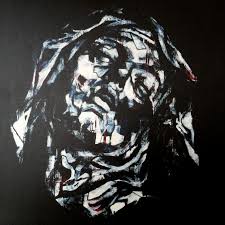The debut album by Italy’s Sonic Jesus is a dark, uncompromising listen. Ninety minutes long, it’s spread over four sides of vinyl, each with their own distinct character, though the differences between them may not be immediately apparent. On the surface, Sonic Jesus are yet another band in the seemingly never ending nu-psych/shoegaze revival; droning, gothic, heavy and hypnotic. What sets them apart, is the sheer unrelenting density and stubborn trudge of Neither Virtue Nor Anger. In listening to this album all the way through, – preferably loud and in the dark – you feel like you’re embarking on an epic descent into some collective psychic and spiritual underworld, from which you may never emerge. Morbidly introspective, it’s also a driving heavy metal exercise in docility – like a 21st century Hawkwind. And its uncompromising dedication to pursuing its own singularly dank metaphor finally lifts this record above most of its peers towards the flagellant intensity of Current 93 or Swans.
Better perhaps to take it a side at a time. Side one begins slowly, with ‘Locomotive,’ a hesitantly chiming guitar and keening funereal vocals. It’s nearly three minutes before a steady, ritualistic beat comes in, building steadily to an explosion sometime after the four-minute mark, when the song finally lives up to its title and becomes a train gathering steam, building up speed as it moves apace down the track, the furnace finally igniting. A tolling bell introduces the gothic-motorik bass and organ groove of ‘Triumph,’ sounding like early Sisters of Mercy meets the Black Angels, or A Place To Bury Strangers if they discovered subtlety; an early highpoint. The hammering ‘Reich’ takes us back to Psychocandy and more psychedelic gothic punk with hints of White Hills, while the Farfisa-sounding organ and reverb-heavy guitar lend a Texan twang to proceedings. ‘Sweet Suicide’ meanwhile has a steady, shoulder-swaying rhythm with impenetrable, distorted vocals and impolite blasts of fuzz interrupting the rolling bass and drums.
So far so good, but on side two it all starts to become a bit over familiar. Certainly the pastiches are expertly done, as a Suicide/Mysterians organ cuts through the murky fuzz of ‘Dead’, which otherwise could easily be the Warlocks or the Black Angels, while ‘Lost Reprise (Francesca)’ is pure Spiritualized shimmer, or the Brian Jonestown Massacre in a narcotic Velvets haze. The lively fairground organ of ‘Drift 22’ at least evokes the wilful eccentricity of Clinic, atop the gothic rumble of a more controlled Eighties Matchbox B-line Disaster.
Thankfully things start to get somewhat more interesting on the album’s third side, as if having proved their ability to match the sound of their predecessors, Sonic Jesus now feel free to experiment and innovate. It’s hard to say how songs like ‘Monkey On My Back’ or ‘Luxury’ transcend the form, other than in being expertly eerie musical creations replete with stronger than average melodies and atmosphere. Certainly the minimal electronic pulse beat of ‘Whore is Death’ surprises by never evolving into the Georgio Moroder groove you might expect, instead cultivating an almost Kurt Weill ugliness and angularity, the primitive drums fighting against the electronic rhythm to near-nightmarish effect. A haunting clarinet lie breaks up the gloomy clang of ‘My Lunacy’ before the song suddenly breaks down into a sparse acoustic lament, and then just as suddenly erupts again in groaning sirens like some incredibly ancient piece of mysterious, magical trance music.
Throughout the album the vocals are made indecipherable by distortion, but come over like the guttural ravings of some possessed wilderness preacher, part way between Fields Of The Nephilim’s Carl McCoy and the singer from Sand’s dry-as-dust krautrock classic Golem. The titles though often seem suited to the music, regardless of lyrics; hence the chilly, ominous and gristly horror of ‘Cancer’ or the Morse code-like dot-dash rhythm of ‘Telegraph.’ ‘Underground’ seems dark and grubby with earth and soil, the organ stabbing through like a hand clawing free of the grave, until the song builds to an unhinged, howling climax. And the album ends, as it must, with ‘Kali Yuga’ – the last of the four stages of the world according to Hindu scripture, and an era of unprecedented hardship and strife. Yet this is a surprisingly calm and meditative conclusion, the gentle pulse overlaid with monastic chanting and hypnotic guitar glissandos. Like a lot of the album, it feels closer in some ways to the dark, minimalist techno of someone like Plastikman than to the dynamics of conventional rock music.
At times punishing and primitive, Neither Virtue Nor Anger possesses an elusive, brutal beauty. It may not win over anyone who feels that – fifteen years on from the first Warlocks album – the psych-drone cul-de-sac has long since reached its dead end. But for those still open to new refinements, fresh mysteries and ecstasies within the form, then Sonic Jesus have conclusively proved themselves the contemporary masters.
<div class="fb-comments" data-href="http://thequietus.com/articles/17647-sonic-jesus-neither-virtue-nor-anger-review” data-width="550">


